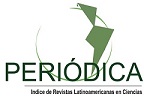Nuevos registros de Pucciniales sobre la familia Solanaceae en Colombia
New records of Pucciniales on solanaceae family in Colombia
DOI:
https://doi.org/10.15446/rev.fac.cienc.v8n1.70330Keywords:
Biodiversidad, Fitoparásitos, Nuevos hospedantes, Royas, Uredinales (es)Biodiversity, New host, Phytoparasitic, Rust, Uredinales (en)
Downloads
The Solanaceae family has a great diversity of species distributed from the temperate zones with the exception of Antarctica, tropical and warm areas. Some of its economically important plants such as peppers, potatoes and tomatoes, are commonly parasitized by rusts, affecting their quality and production. The objective of this research was to study the Pucciniales of the Solanaceae family in Colombia, this deposited in the Museo Micológico at the Universidad Nacional de Colombia Medellín (MMUNM) campus. Unidentified collections of this group of plants were analyzed with symptoms of rusts fungi (Pucciniales, Basidiomycota) and were collected during the last few years in the provinces of Antioquia, Caqueta, Caldas, Casanare, Cundinamarca, Huila, Magdalena and Nariño. The taxomonic work of the Pucciniales was conducted through observations, morphometric analysis and an exhaustive bibliographic review. Uredo mirtoideae is described as a new species for science and ten new hosts parasitized by rusts. In Colombia 23 rust fungi species are registered on the Solanaceae family, equivalent to 6% of the total of those reported in the country, and are currently found parasitizing a total of 43 host species of this important family.
References
Buriticá, P. & Hennen, J. F. (1980). Pucciniosireae (Uredinales, Pucciniaceae). Flora neotrópica. The New York Botanical Garden, New York, USA, monografía (24), 1-45.
Buriticá, P. & Pardo-Cardona, V. M. (1996). Flora Uredineana Colombiana. Revista de la Académica Colombiana de Ciencias Exactas, Físicas y Naturales, 20(77), 183-236.
Buriticá, P.; Salazar-Yepes, M. & Pardo-Cardona, V. M. (2014). Pucciniales (Fungi), Royas de Colombia. Revista Facultad Nacional de Agronomía, Medellín, 67(1), 1-93.
Cadavid-Sánchez, I. C. (2013). Tipificación molecular y separación de especies de plantas del subgénero Leptostemonum (Solanaceae: Solanum), usando regiones barcode. (Tesis de maestría, Universidad Nacional de Colombia sede Medellín, Facultad de Ciencias). Recuperado de http://www.bdigital.unal.edu.co/9516/1/1128267329.2013.pdf
Cummins, G. B. & Hiratsuka, Y. (Third ed). (2003). Illustrated genera of rust fungi. St. Paul , Minnesota: American Phytopathological Society.
Kern, F. D. & Whetzel H. H. (1930). Uredinales. Mycological explorations of Colombia. Journal of the Department of Agriculture of Puerto Rico,14, 301-349.
Kern, F. D.; Thurston, H. W. & Whetzel, H. H. (1933). Annotated index of the rusts of Colombia. Mycologia, 25, 448-503.
Mayor, E. (1913). Contribution a l'etude des Uredinées de Colombie. Mémoires Societes Neuchatel Sciences Naturelles, 5, 442-509.
Pardo-Cardona, V. M. (2002). Especies microcíclicas de Puccinia Persoon sobre Solanum L. en Colombia. Caldasia, 23(2), 427-434.
Pardo-Cardona, V. M. (2006). Uredinales de Plantas Cultivadas de Interés Floral en Colombia. Revista Facultad Nacional de Agronomía, Medellín, 59(1), 3335-3353.
Passador, M. M.; Furtado, E. L. & Figueiredo, M. B. (2009). Especificidade de Puccinia pampeana a Cultivares de Capsicum spp. e outras solanáceas. Summa Phytopathol., Botucatu, 35(1), 63-64.
Quijano, S. O. & Molina, V. L. A. (1987). Control Químico de la Roya (Puccinia pittieriana Henn.) en papa de la variedad "parda pastusa" en el departamento de Nariño. Revista de Ciencias Agrícolas, Universidad de Nariño, 10(3 y 4), 33-34.
How to Cite
APA
ACM
ACS
ABNT
Chicago
Harvard
IEEE
MLA
Turabian
Vancouver
Download Citation
CrossRef Cited-by
1. Quentin Paynter. (2024). Literature reviews narrow down where to search for agents for Urena lobata and Solanum torvum: Pantropical weeds with poorly defined native ranges. Biological Control, 196, p.105566. https://doi.org/10.1016/j.biocontrol.2024.105566.
Dimensions
PlumX
Article abstract page views
Downloads
License
Copyright (c) 2019 Revista de la Facultad de Ciencias

This work is licensed under a Creative Commons Attribution-NonCommercial-NoDerivatives 4.0 International License.
The authors or copyright holders of each paper confer to the Journal of the Faculty of Sciences of Universidad Nacional de Colombia a non-exclusive, limited and free authorization on the paper that, once evaluated and approved, is sent for its subsequent publication in accordance with the following characteristics:
- The corrected version is sent according to the suggestions of the evaluators and it is clarified that the paper mentioned is an unpublished document on which the rights are authorized and full responsibility is assumed for the content of the work before both the Journal of the Faculty of Sciences, Universidad Nacional de Colombia and third parties.
- The authorization granted to the Journal will be in force from the date it is included in the respective volume and number of the Journal of the Faculty of Sciences in the Open Journal Systems and on the Journal’s home page (https://revistas.unal.edu.co/index.php/rfc/index), as well as in the different databases and data indexes in which the publication is indexed.
- The authors authorize the Journal of the Faculty of Sciences of Universidad Nacional de Colombia to publish the document in the format in which it is required (printed, digital, electronic or any other known or to be known) and authorize the Journal of the Faculty of Sciences to include the work in the indexes and search engines deemed necessary to promote its diffusion.
- The authors accept that the authorization is given free of charge, and therefore they waive any right to receive any emolument for the publication, distribution, public communication, and any other use made under the terms of this authorization.
- All the contents of the Journal of the Faculty of Sciences are published under the Creative Commons Attribution – Non-commercial – Without Derivative 4.0.License
MODEL LETTER OF PRESENTATION and TRANSFER OF COPYRIGHTS
Personal data processing policy
The names and email addresses entered in this Journal will be used exclusively for the purposes set out in it and will not be provided to third parties or used for other purposes.




















